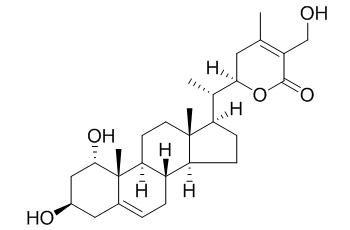Sominone
Sominone improves memory impairments and increases axonal density in Alzheimer's disease model mice. It enhances neurite outgrowth and spatial memory mediated by the neurotrophic factor receptor, RET.
Inquire / Order:
manager@chemfaces.com
Technical Inquiries:
service@chemfaces.com
Tel:
+86-27-84237783
Fax:
+86-27-84254680
Address:
1 Building, No. 83, CheCheng Rd., Wuhan Economic and Technological Development Zone, Wuhan, Hubei 430056, PRC
Providing storage is as stated on the product vial and the vial is kept tightly sealed, the product can be stored for up to
24 months(2-8C).
Wherever possible, you should prepare and use solutions on the same day. However, if you need to make up stock solutions in advance, we recommend that you store the solution as aliquots in tightly sealed vials at -20C. Generally, these will be useable for up to two weeks. Before use, and prior to opening the vial we recommend that you allow your product to equilibrate to room temperature for at least 1 hour.
Need more advice on solubility, usage and handling? Please email to: service@chemfaces.com
The packaging of the product may have turned upside down during transportation, resulting in the natural compounds adhering to the neck or cap of the vial. take the vial out of its packaging and gently shake to let the compounds fall to the bottom of the vial. for liquid products, centrifuge at 200-500 RPM to gather the liquid at the bottom of the vial. try to avoid loss or contamination during handling.
Applied Biological Chemistry2022, 65(12)
Pharm Biol.2016, 54(7):1255-62
Front Plant Sci.2022, 13: 905275.
BMC Complement Med Ther. 2020, 20(1):94.
Molecules2021, 26(1),230
Molecules.2020, 25(18),4089.
Food Chem.2019, 274:345-350
iScience.2024, 27(8):110496.
J Cachexia Sarcopenia Muscle.2022, 13(6):3149-3162.
Enzyme Microb Technol.2022, 161:110111.
Related and Featured Products
Eur J Neurosci. 2006 Mar;23(6):1417-26.
Withanoside IV and its active metabolite, sominone, attenuate Abeta(25-35)-induced neurodegeneration.[Pubmed:
16553605 ]
At the present, medication of dementia is limited to symptomatic treatments such as the use of cholinesterase inhibitors. To cure dementia completely, that is regaining neuronal function, reconstruction of neuronal networks is necessary. Therefore, we have been exploring antidementia drugs based on reconstructing neuronal networks in the damaged brain and found that withanoside IV (a constituent of Ashwagandha; the root of Withania somnifera) induced neurite outgrowth in cultured rat cortical neurons.
METHODS AND RESULTS:
Oral administration of withanoside IV (10 micromol/kg/day) significantly improved memory deficits in Abeta(25-35)-injected (25 nmol, i.c.v.) mice and prevented loss of axons, dendrites, and synapses. Sominone, an aglycone of withanoside IV, was identified as the main metabolite after oral administration of withanoside IV. Sominone (1 microM) induced axonal and dendritic regeneration and synaptic reconstruction significantly in cultured rat cortical neurons damaged by 10 microM Abeta(25-35).
CONCLUSIONS:
These data suggest that orally administrated withanoside IV may ameliorate neuronal dysfunction in Alzheimer's disease and that the active principle after metabolism is Sominone.
Br J Pharmacol. 2009 Aug;157(8):1427-40.
Sominone enhances neurite outgrowth and spatial memory mediated by the neurotrophic factor receptor, RET.[Pubmed:
19594760 ]
Orally administered withanoside IV (a compound isolated from the roots of Withania somnifera) improved memory deficits in mice with a model of Alzheimer's disease induced by the amyloid peptide Abeta(25-35). Sominone, an aglycone of withanoside IV, was identified as an active metabolite after oral administration of withanoside IV. We aimed to identify receptors or associated molecules of Sominone, and to investigate the effects of Sominone on memory in normal mice.
EXPERIMENTAL APPROACH:
Phosphorylation levels of 71 molecules were compared between control and Sominone-stimulated cortical cultured cells to search for target molecules of Sominone. Object location memory and neurite density in the brain were evaluated in Sominone-injected mice.
KEY RESULTS:
Phosphorylation of RET (a receptor for the glial cell line-derived neurotrophic factor, GDNF) was increased in neurons by Sominone, without affecting the synthesis and secretion of GDNF. Knockdown of RET prevented Sominone-induced outgrowths of axons and dendrites. After a single i.p. injection of Sominone into normal mice, they could better memorize scenery information than control mice. Sixty minutes after Sominone injection, RET phosphorylation was increased, particularly in the hippocampus of mice. After the memory tests, the densities of axons and dendrites were increased in the hippocampus by Sominone administration.
CONCLUSIONS AND IMPLICATIONS:
Sominone could reinforce the morphological plasticity of neurons by activation of the RET pathway and thus enhance memory. Sominone, a compound with low molecular weight, may be a GDNF-independent stimulator of the RET pathway and/or a novel modulator of RET signalling.
Int J Neurosci. 2011 Apr;121(4):181-90.
Sominone improves memory impairments and increases axonal density in Alzheimer's disease model mice, 5XFAD.[Pubmed:
21329473 ]
Previously we showed that steroidal sapogenin, Sominone improved memory after a single i.p. injection into normal mice. However, it had not been reported that Sominone could recover memory deficits in a severe Alzheimer's disease (AD) model animal. Therefore, we aimed to investigate that Sominone improved memory impairments in the 5XFAD mouse, model for AD.
METHODS AND RESULTS:
In the current study, we used Sominone that we had synthesized. 5XFAD mice were given 10 μmol/kg Sominone intraperitoneally for 9 days. In addition to object recognition memory, axonal density, amyloid plaque number, and activated microglia in the brain were evaluated. Sominone treatment significantly improved object recognition memory compared with vehicle control treatment. Sominone treatment significantly enhanced axonal densities in the frontal cortex and parietal cortex but had no effects on amyloid plaque number and activated microglia. In cultured cortical neurons, the axonal length was significantly reduced by Aβ(1-42) treatment. However, that was markedly recovered 5 days after the treatment with 1 μM Sominone. Neuronal loss was not observed in the cortex and hippocampus of 5XFAD mice at 6-8 months of age.
CONCLUSIONS:
These results suggest that memory deficits in AD may be improved by Sominone independently of reducing amyloid plaques and neuroinflammation.



